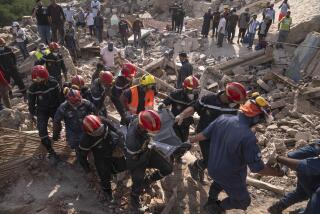Material Needs Being Met in Cameroon Disaster
- Share via
YAOUNDE, Cameroon — Government officials and Western diplomats agreed Thursday that the immediate material needs of the victims of last week’s toxic gas disaster are well in hand, even if their psychological wounds are still untended.
“What you have is a terrible but well-managed crisis,” said Neal Walsh, a U.S. Information Agency officer in Yaounde. “The disaster is under control.”
Francis Yengo, prefect of the Menchum district, which includes the disaster area, added, “The people need medicines, they need food, and they need shelter . . . and this is just what we are (getting).”
The biggest concern now is the thousands of livestock carcasses littering an area of about six square miles in northwestern Cameroon, the area that was hardest hit when poisonous gas erupted from the bottom of a volcanic lake Aug. 21. The gas enveloped villages nearby and killed more than 1,500 people.
Gas Effects Described
Survivors describe people waking up, gasping for breath, and ripping off their clothing because of the intense heat as they ran from their homes in a futile effort to escape the gas.
The dead have nearly all been buried, though army teams continue to find a body here and there in the underbrush.
“We have disposed of all the human material, but the animals are still there,” Prefect Yengo said in an interview on Yaounde radio. “So our greatest preoccupation now is how to dispose of these animals.”
He said equipment is on the way to deal with the animal problem, and once it arrives, “we shall have been saved perhaps from future epidemics.”
The six-square-mile area around the lake has been sealed off by the army until the dead livestock can be disposed of, and evacuated villagers have been ordered not to return to their homes.
Yengo and Western diplomats involved in an international relief effort said Thursday that food, medicine and shelter, either here or on the way, appear adequate for those injured in the disaster or evacuated from their homes.
Bedding Received
“I think that for now we are getting on quite well with the resettlement problem,” Yengo said. “Last night, we received a good number of (sleeping) bags, blankets and sheets.”
He said a community center had been designated for refugees in the district capital at Wum, and a high school is available if needed.
Many of the evacuated people have gone into neighboring villages where they have relatives to help them, Yengo noted.
Walsh, the information officer, said: “There are people who have been moved out of their homes, but they’ve gotten support of either families or the government. So there are no real homeless.”
The United States is one of several Western countries aiding in the relief effort.
More to Read
Sign up for Essential California
The most important California stories and recommendations in your inbox every morning.
You may occasionally receive promotional content from the Los Angeles Times.













